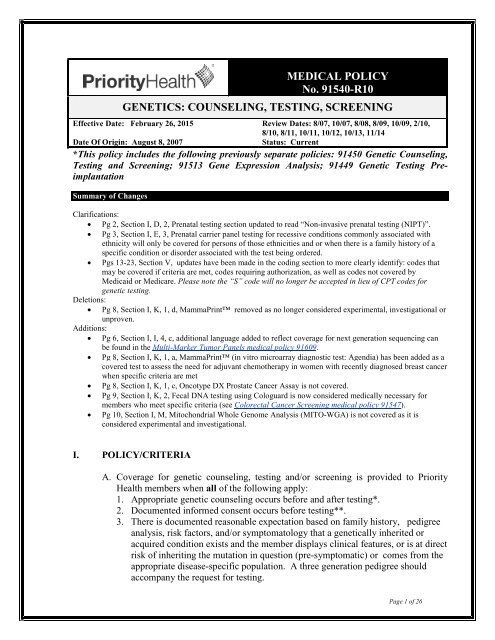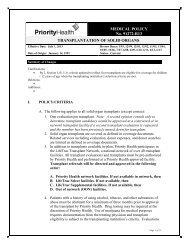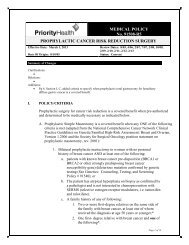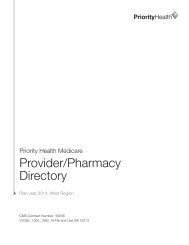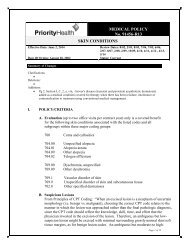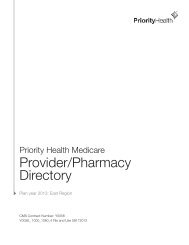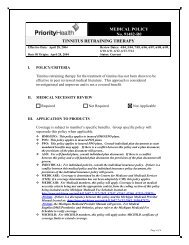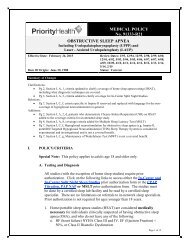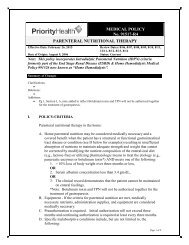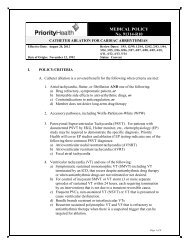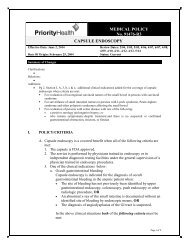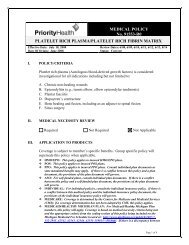Genetics: Counseling, Testing, Screening - Priority Health
Genetics: Counseling, Testing, Screening - Priority Health
Genetics: Counseling, Testing, Screening - Priority Health
Create successful ePaper yourself
Turn your PDF publications into a flip-book with our unique Google optimized e-Paper software.
MEDICAL POLICYNo. 91540-R10GENETICS: COUNSELING, TESTING, SCREENINGEffective Date: February 26, 2015 Review Dates: 8/07, 10/07, 8/08, 8/09, 10/09, 2/10,8/10, 8/11, 10/11, 10/12, 10/13, 11/14Date Of Origin: August 8, 2007Status: Current*This policy includes the following previously separate policies: 91450 Genetic <strong>Counseling</strong>,<strong>Testing</strong> and <strong>Screening</strong>; 91513 Gene Expression Analysis; 91449 Genetic <strong>Testing</strong> PreimplantationSummary of ChangesClarifications:• Pg 2, Section I, D, 2, Prenatal testing section updated to read “Non-invasive prenatal testing (NIPT)”.• Pg 3, Section I, E, 3, Prenatal carrier panel testing for recessive conditions commonly associated withethnicity will only be covered for persons of those ethnicities and or when there is a family history of aspecific condition or disorder associated with the test being ordered.• Pgs 13-23, Section V, updates have been made in the coding section to more clearly identify: codes thatmay be covered if criteria are met, codes requiring authorization, as well as codes not covered byMedicaid or Medicare. Please note the “S” code will no longer be accepted in lieu of CPT codes forgenetic testing.Deletions:• Pg 8, Section I, K, 1, d, MammaPrint removed as no longer considered experimental, investigational orunproven.Additions:• Pg 6, Section I, I, 4, c, additional language added to reflect coverage for next generation sequencing canbe found in the Multi-Marker Tumor Panels medical policy 91609.• Pg 8, Section I, K, 1, a, MammaPrint (in vitro microarray diagnostic test: Agendia) has been added as acovered test to assess the need for adjuvant chemotherapy in women with recently diagnosed breast cancerwhen specific criteria are met• Pg 8, Section I, K, 1, c, Oncotype DX Prostate Cancer Assay is not covered.• Pg 9, Section I, K, 2, Fecal DNA testing using Cologuard is now considered medically necessary formembers who meet specific criteria (see Colorectal Cancer <strong>Screening</strong> medical policy 91547).• Pg 10, Section I, M, Mitochondrial Whole Genome Analysis (MITO-WGA) is not covered as it isconsidered experimental and investigational.I. POLICY/CRITERIAA. Coverage for genetic counseling, testing and/or screening is provided to <strong>Priority</strong><strong>Health</strong> members when all of the following apply:1. Appropriate genetic counseling occurs before and after testing*.2. Documented informed consent occurs before testing**.3. There is documented reasonable expectation based on family history, pedigreeanalysis, risk factors, and/or symptomatology that a genetically inherited oracquired condition exists and the member displays clinical features, or is at directrisk of inheriting the mutation in question (pre-symptomatic) or comes from theappropriate disease-specific population. A three generation pedigree shouldaccompany the request for testing.Page 1 of 26
MEDICAL POLICYNo. 91540-R10<strong>Genetics</strong>: <strong>Counseling</strong>, <strong>Testing</strong>and <strong>Screening</strong>4. Knowledge of the presence or absence of condition would directly affect medicalcare of the member.a. The disease is treatable and/or preventable andb. The test results will lead to a marked change in the intensity of surveillancefrequency and /or intensity of treatment for that disease.5. The testing is FDA / CLIA approved6. <strong>Testing</strong> is ordered by the appropriate provider, see section C below:*Members must have genetic counseling by a genetic counselor before testing canoccur for certain conditions (see appendix A below). <strong>Counseling</strong> can occur at thesame visit as the sample(s) for testing are collected with appropriate documentationas defined above. Genetic <strong>Counseling</strong> must be performed by a board certifiedgenetic counselor that is independent of the laboratory performing the requestedtesting.** <strong>Health</strong> care practitioners in the State of Michigan must follow state law regardinginformed consent for predictive genetic testing. (Michigan State Law. 333.17020Genetic test; informed consent).B. Coverage for Family Planning and Infertility Services is generally limited andsubject to applicable copays and or coinsurance. A custom plan Amendment mayadd additional coverage for certain plans only. See specific plan documents fordetails. Family Planning and Infertility services of any kind are NOT covered forMedicaid/<strong>Health</strong>y Michigan Plan members.C. Limits/IndicationsNine medically appropriate genetic testing categories appear in Sections D throughL; these sections identify providers authorized to order the tests and give examplesof indications for testing. Selected tests require prior authorization. Refer to SectionV, Coding Information, of this policy for specific prior authorization requirementsby CPT code. See Appendix A below for a list of specific conditions for whichgenetic counseling is required and/or recommended.D. Prenatal <strong>Testing</strong>1. Prenatal screening via maternal serum analysis (first and/or second trimester)with nuchal translucency* measurement may be covered for all pregnant womenwithin the prescribed time frame for each of the maternal serum screeningoptions.2. Non-invasive prenatal testing (NIPT) for fetal aneuploidies trisomy 21, 13 and18 using tests that analyze circulating cell-free DNA extracted from a maternalblood sample is covered when appropriate genetic counseling occurs prior totesting and the member meets one of the following criteria:a. The member is of advanced maternal age, defined as age 35 or over at thetime of delivery or;Page 2 of 26
MEDICAL POLICYNo. 91540-R10<strong>Genetics</strong>: <strong>Counseling</strong>, <strong>Testing</strong>and <strong>Screening</strong>b. The member has fetal aneuploidy screening test results including maternalserum screening (elevated free beta-hCG) and/or an ultrasound evaluationindicating an increased probability of trisomy 21.3.3. Prenatal diagnostic genetic testing (via amniocentesis or chorionic villussampling) will be covered for pregnant women when the member has receivedgenetic counseling by a genetic counselor, the reason for testing is documented,and the testing is ordered by a Family Practice physician providing OB servicesor by an Obstetrician. Common indications for prenatal diagnosis include butare not limited to:a. Abnormal fetal ultrasound findingsb. Abnormal maternal serum first trimester screening, second trimester triple orquad screen, integrated* or alpha-fetoprotein, elevated MSAFPc. Increased risk based on documented family history or carrier status4. Prenatal diagnostic genetic testing is not a covered benefit for:a. Sex determination unless medically indicatedb. Prenatal determination of paternityc. Preconceptual testing of sperm, ova, embryos for use in assisted reproduction( e.g. artificial insemination, IVF)*Nuchal translucency (NT) measurement will only be covered when combined withfirst trimester serum screening (“combined testing”) at centers which haveappropriate certification to do so by either the Fetal Medicine Foundation (FMF) orthe Nuchal Translucency Quality Review Program (NTQR). Nuchal translucencymeasurement alone is not a covered benefit.E. Genetic Carrier <strong>Screening</strong>: Indications for genetic carrier testing for at- riskindividuals include but are not limited to:1. African American, Caribbean, West-Indian, West African, Hispanic Caribbean,Mediterranean, Asian, Middle Eastern and other individuals who may be at riskfor hemoglobinopathies including sickle cell anemia, alpha and/or betathalassemia based on ethnicity.2. Ashkenazi disease screen, for individuals of Jewish descent (e.g., Tay Sachs,Canavan’s Disease, etc.)3. Prenatal carrier panel testing for recessive conditions commonly associated withethnicity will only be covered for persons of those ethnicities and or when thereis a family history of a specific condition or disorder associated with the testbeing ordered.4. Carrier testing* for cystic fibrosis (CF) is medically necessary for members inany of the following groups:a. Couples seeking prenatal careb. Couples who are planning a pregnancyc. Reproductive partners of persons who have CF or are carriers of CFd. Males with a diagnosis of congenital bilateral absence of the vas deferens(CBAVD)Page 3 of 26
MEDICAL POLICYNo. 91540-R10<strong>Genetics</strong>: <strong>Counseling</strong>, <strong>Testing</strong>and <strong>Screening</strong>e. For persons with a family history of CF or a first degree relative identified asa CF carrier see section F below for coverage rulesGenetic carrier screening for CF is considered experimental and investigational forall other indications.*Covered testing is for a core panel of 25 mutations that are recommended by theAmerican College of Medical <strong>Genetics</strong> (ACMG) medically necessary for cysticfibrosis genetic testing. The standard mutation panel is available at: http://www.amaassn.org/ama/no-index/about-ama/3021.shtm.<strong>Testing</strong> for additional CF mutationsthrough an expanded panel will be covered for certain indications whenrecommended by a genetic counselor.F. Genetic Carrier <strong>Testing</strong>: <strong>Testing</strong> for carrier status of parents with a known geneticrisk or suspected carrier status based on their reproductive and/or family history.This testing should only be ordered following genetic counseling by a geneticcounselor.1. Individuals with a known family history of a recessive genetic condition (i.e.Spinal Muscular Atrophy, Sickle Cell, Cystic Fibrosis).2. Family members of infants identified by newborn screening as affected orcarriers of a genetic condition.3. Parental chromosome analysis following the diagnosis of a child with achromosome abnormality for which a parent may be carrying a chromosomerearrangement or abnormality.4. Chromosome analysis for couples with 2 or more miscarriages.G. Suspected Genetic Conditions/ Diagnostic testing – Pediatrics (
MEDICAL POLICYNo. 91540-R10<strong>Genetics</strong>: <strong>Counseling</strong>, <strong>Testing</strong>and <strong>Screening</strong>b. Conditions with a known or suspected chromosomal, single gene,mitochondrial, or multifactorial etiologyc. Unexplained failure to thrived. Unexplained developmental delay or loss of developmental milestonese. Unusual growth patternf. In-utero death of the fetus in the second or third trimesterH. Prognostic <strong>Testing</strong>: Prognostic testing may be done when the clinical presentationis suggestive of a specific condition and the results will help to determine additionaltesting or treatment modalities related to existing nonhereditary conditions including,but not limited to the following:1. Chromosomal analysis for leukemia2. Flow cytometry for lymphoma3. Her2Neu for breast cancer4. HLA Haplotype Analysis for transplant procedures5. P53 Tumor Marker6. HLA genotyping for Celiac associated DQ alleles when serologic testing and orintestinal biopsy results are inconsistent with one another or clinical presentation.<strong>Priority</strong> <strong>Health</strong> will cover prognostic genetic testing only when recommended byGenetic Counselors or ordered by specialty physicians with expertise in the specificclinical area for which the testing is being done.I. Predictive Genetic <strong>Testing</strong>: Predictive testing is offered to asymptomaticindividuals with a family history of a genetic disorder. Predictive testing is of twotypes:• presymptomatic (eventual development of symptoms is certain when thegene mutation is present, e.g., Huntington disease) and• predispositional (eventual development of symptoms is likely but notcertain when the gene mutation is present, e.g., breast cancer).1. <strong>Priority</strong> <strong>Health</strong> will cover hereditary predisposition/pre-symptomatic genetictesting only when recommended by a Genetic Counselor2. All genetic testing in this Section requires prior authorization by <strong>Priority</strong> <strong>Health</strong>,and must include documentation:a. Of medical necessityb. That genetic counseling has been accomplishedc. That informed consent has been obtainedd. Results of familial mutation / test results are available upon request3. Predictive testing* is MEDICALLY INDICATED only if early diagnosis allowsinterventions which reduce morbidity or mortality. Predictive testing for thepresence of presymptomatic or predisposition genetic changes in an at-riskindividual may be done for conditions such as:a. BRCA1/BRCA2Page 5 of 26
MEDICAL POLICYNo. 91540-R10<strong>Genetics</strong>: <strong>Counseling</strong>, <strong>Testing</strong>and <strong>Screening</strong>b. Hereditary nonpolyposis colorectal cancer (HNPCC) and other familialcolorectal syndromesc. Huntington’s Choread. Multiple Endocrine Neoplasiae. Myotonic Dystrophyf. Family history of genetic disorders (for example, a previous child withDuchenne’s Muscular Dystrophy)g. CADASIL Genetic <strong>Testing</strong>: DNA testing for CADASIL is considered to bemedically necessary for either of the following indications:i. Symptomatic individuals who have a family history consistent with anautosomal dominant pattern of inheritance of this condition (clinical signsand symptoms of CADASIL include stroke, cognitive defects and/ordementia, migraine, and psychiatric disturbances); orii. Pre-symptomatic individuals where there is a family history consistentwith an autosomal dominant pattern of inheritance and there is a knownmutation in an affected member of the family.CADASIL genetic testing is considered experimental and investigational forall other indications.* Complete the General Genetic <strong>Testing</strong> (including Breast and Ovarian Cancer<strong>Screening</strong>) prior authorization form.4. The following testing is considered experimental and investigational.a. Genetic testing (e.g., presenilin-1 gene, apolipoprotein E epsilon 4 allele,amyloid precursor gene, etc.) for the diagnosis and assessment of persons withAlzheimer disease and related dementias.b. Genetic testing for complex eye disorders such as age-related maculardegeneration and late-onset primary open angle glaucoma, PreDx DiabetesRisk Test , deCODE T2, deCODE AF, deCODE MI, deCODEGlaucoma, deCODEme Cancer, deCODE BreastCancer and BREVAGenBreast Cancer Risk Stratification Test deCODE ProstateCancer 9p21MICheck, and deCODEme Cardio.c. Hereditary multigene, next generation (next-gen) sequencing panels (seeMulti-Marker Solid Tumor Panels medical policy 91609 for exceptions), orother cancer panels (e.g., BRCAplus, BreastNext, CancerNext,ColoNext, FoundationHeme, OvaNext) to determine susceptibility tohereditary cancers, to diagnose cancer or determine treatment.J. Preimplantation Genetic Diagnosis (PGD): Preimplantation genetic diagnosis(PGD), including the oocyte polar body or cleavage stage embryo biopsy procedure,associated genetic testing, and pre- and post-test genetic counseling associated withPGD, is considered medically necessary when the results of the genetic test willimpact clinical decision making and/or clinical outcome. PGD requires priorauthorization. PGD in the following situations is intended to be used as analternative to prenatal genetic diagnosis using amniocentesis or chorionic villusPage 6 of 26
MEDICAL POLICYNo. 91540-R10<strong>Genetics</strong>: <strong>Counseling</strong>, <strong>Testing</strong>and <strong>Screening</strong>sampling (CVS) and only when a reliable genetic test exists for the disorder and iswell established:1. For the detection of single gene disorders for the following situations:a. Both partners are known carriers of a single autosomal recessive geneb. One partner is a known carrier of a single gene autosomal dominant disorderc. One partner is a known carrier of a single X-linked disorderThe disorders resulting from the above genetic disorders (a-c) arepotentially lethal or disabling and have limited treatment options andinclude but are not limited to the following: Tay Sachs, spinal muscularatrophy, myotonic dystrophy, Huntington's disease, and X-linkeddisorders including Duchenne's muscular dystrophy and Fragile-Xsyndrome. All disorders for which testing is requested should havesignificant probability for recurrence, i.e. 25% or more likelihood forrecurrence.2. Couples in whom one or more partners has a known chromosomal abnormalitysuch as a balanced translocation.3. PGD is NOT covered for any of the following indications or those not specifiedspecifically above because they are considered experimental, investigational orunproven:a. <strong>Screening</strong> of common aneuploidy in women of advanced maternal age (i.e.,age 35 or older), with repeat IVF failures or recurrent spontaneous abortions,or for the purpose of improving IVF implantation successb. Detection of chromosomal translocations in women of advanced maternalage, with repeat IVF failures or recurrent spontaneous abortions, or for thepurpose of improving IVF implantation successc. For the purpose of human leukocyte antigen (HLA) typing of an embryo toidentify a future suitable stem cell, tissue or organ transplantation donord. For the purposes of carrier testing to determine carrier status of the embryo(determination of carrier status is performed on individuals contemplatingreproduction)e. Using blastocyst stage biopsyf. For adult-onset/late-onset disorders (e.g., Alzheimer's disease; cancerpredisposition)g. <strong>Testing</strong> of embryos for non-medical gender selection or non-medical traits4. All other services associated with PGD are subject to the member’s specificpolicy and associated plan documents. This includes, but is not limited to, allservices and supplies relating to artificial insemination, in-vitro fertilization,embryo or ovum transfer procedures, any other assisted reproduction procedure,prescription drugs designed to achieve pregnancy, and ultrasounds for eggharvest. Please refer to the appropriate plan documents for further information.5. For Medicaid, <strong>Health</strong>y Michigan Plan and MIChild – IVF, artificial inseminationand other forms of infertility treatment are not a covered benefit, thereforePage 7 of 26
MEDICAL POLICYNo. 91540-R10<strong>Genetics</strong>: <strong>Counseling</strong>, <strong>Testing</strong>and <strong>Screening</strong>genetic counseling/testing/screening done in conjunction with these serviceswould not be covered.K. Gene Expression Analysis: see specific areas of application below. Priorauthorization may be required for any covered applications. The only exception isBreast Cancer Treatment Assessment with Oncotype DX.1. Breast Cancer Treatment AssessmentSeveral panels of gene expression markers have been developed for the purposeof predicting the likelihood of breast cancer recurrence in various populations ofwomen with node-negative disease. These panels may be useful for identifyingwomen who are unlikely to experience recurrence and, thus, unlikely to benefitfrom adjuvant chemotherapy. Such panels are designed to identify women whocan safely avoid adjuvant chemotherapy, without negatively affecting diseasefreeand overall survival outcomes.a. Oncotype DX Breast (21-gene panel; Genomic <strong>Health</strong>) andMammaPrint (in vitro microarray diagnostic test: Agendia) are consideredmedically appropriate to assess the need for adjuvant chemotherapy inwomen with recently diagnosed breast cancer when all of the followingcriteria (i-vi) are met. Prior authorization is not required.i. Breast tumor is stage 1 or stage 2.ii. Breast tumor is estrogen-receptor positive.iii. Breast tumor is HER2-receptor negative, or breast tumor is HER2receptor positive and less than 1 cm in diameter.iv. There is no evidence of metastatic breast cancer, and the patient isaxillary-node negative (nodes with micrometastases less than 2 mm insize are considered node negative) or has 1-3 positive nodes.v. The patient is a candidate for possible adjuvant chemotherapy (i.e.,chemotherapy is not precluded due to other factors).vi. Member and physician (prior to testing) have discussed the potentialresults of the test and agree to use the results to guide therapy (i.e.,member will forgo adjuvant chemotherapy if Oncotype Dx score is low).b. For patients choosing chemotherapy for an intermediate risk score, theclinical rationale must be provided for treatment since chemotherapy is stillof unproven benefit.c. Oncotype DX TM is not covered for any other clinical evaluation includingOncotype DX TM Colon Cancer Assay and Oncotype DX Prostate CancerAssay.d. Other assays of genetic expression in tumor tissue (e.g., Rotterdam Signature76-Panel) are not covered because they are considered experimental,investigational or unproven.2. Fecal DNA <strong>Screening</strong> for Colorectal CancerFecal DNA testing is performed on stool samples that are submitted to alaboratory after being collected by patients at home. The test is designed as ascreening option for patients who are unwilling or unable to undergo aPage 8 of 26
MEDICAL POLICYNo. 91540-R10<strong>Genetics</strong>: <strong>Counseling</strong>, <strong>Testing</strong>and <strong>Screening</strong>colonoscopy. The test detects colorectal cancer based on the presence of specific,cancer-associated mutations in DNA that is extracted from the stool sample.These specific DNA mutations in the stool arise from tumors within the colon.This DNA is continuously shed from the tumor into the stool. Patients with apositive fecal DNA test result must then undergo a definitive test for coloncancer, such as a colonoscopy. Fecal DNA testing using Cologuard isconsidered medically necessary for members who meet specific criteria (seeColorectal Cancer <strong>Screening</strong> medical policy 91547).3. Cytochromes P450 (CYP450)The AmpliChip CYP450 test was developed as a clinical test to evaluate anindividual's metabolic capacity for certain drugs by identifying polymorphismsof 2 CYP450 enzymes (ie, CYP2D6 and CYP2D19). Pharmacogenetic factorsoperate at pharmacokinetic as well as pharmacodynamic levels- the twocomponents of the dose-response curve of a drug. Polymorphisms in drugmetabolizing enzymes, transporters and/or pharmacological targets of drugs mayprofoundly influence the dose-response relationship between individuals. Forsome drugs, although retrospective data from case studies suggests that thesepolymorphisms are frequently associated with adverse drug reactions or failureof efficacy, the clinical utility of such data remains unproven. CYP450 isconsidered to be experimental and investigational and is not a covered benefit.4. The AlloMap Molecular Expression Test for Heart Transplantation Rejectionis medically necessary and, therefore, covered when the individual is at least 12months post--heart transplant and:a. Is at least 15 years of ageb. Is considered to be stable (ie, if within the first 12-month transplant windowthere has been no evidence of Grade 2R or Grade 3R graft rejection detectedby endomyocardial biopsies in the first six months post-transplant and theindividual has not deteriorated since the prior clinical assessment).c. Is considered to be a "low risk" for cardiac events (ie, absence of a history ofsevere allograft vasculopathy, absence of antibody-mediated rejection, andabsence of any signs or symptoms of heart failure).5. Gene expression testing to predict coronary artery disease, e.g. Corus Dx, isconsidered experimental and investigational for all applicationsL. <strong>Testing</strong> of member and non-member relatives:1. Genetic testing is not a covered benefit if the test results do not provide directmedical benefit to the member unless it provides direct medical benefit to otherrelatives that are also <strong>Priority</strong> <strong>Health</strong> members and this benefit is documented.2. Genetic testing of a non-member relative of a member may be a covered benefitif all of the criteria in a through e are met:a. The test results are for the direct medical benefit of the member and testingthe nonplan relative is the most cost effective method to obtain the medicallynecessary information for the member.Page 9 of 26
MEDICAL POLICYNo. 91540-R10<strong>Genetics</strong>: <strong>Counseling</strong>, <strong>Testing</strong>and <strong>Screening</strong>b. The nonplan relative’s insurance company has been billed and payment hasbeen denied.c. Coverage is limited to the testing of five nonplan relatives as a lifetimebenefit for a member.d. <strong>Testing</strong> of the non-member relative has been recommended by a geneticscounselor and approved by <strong>Priority</strong> <strong>Health</strong>.e. All genetic testing must be processed through a <strong>Priority</strong> <strong>Health</strong> providerphlebotomist and laboratory, unless otherwise specified by the <strong>Genetics</strong>Counselor.3. In the absence of specific information regarding advances in the knowledge ofmutation characteristics for a particular disorder, the current literature indicatesthat genetic tests for inherited disease need only be conducted once per lifetimeof the member.M. Whole Genome Sequencing, exome sequencing, genome-wide associationstudies, or mitochondrial whole genome analysisWhole genome sequencing (WGS), also known as full genome sequencing (FGS),complete genome sequencing, or entire genome sequencing is a laboratory procedurewhich seeks to determine an individual's entire DNA sequence, specifying the orderof every base pair within the genome at a single time. The relationship betweenmutations in the genomic material of asymptomatic individuals and the developmentof specific diseases is still being analyzed and the role of whole-genome sequencingin the clinical setting has yet to be established.Exome sequencing, also referred to as whole exome sequencing or WES, is analternative to WGS. It is laboratory process to determine the sequence of the proteincoding regions of the genome. The exome is the part of the genomethat encodes protein, where roughly 85 percent of variants are known to contribute todiseases in humans. Exome sequencing has been proposed as a diagnostic method toidentify these genetic variants in patients not diagnosed by traditional diagnostic andgenetic testing approachesGenome-wide association studies (GWAS), also referred to as genome-wideanalysis, is a method of identifying genes involved in human disease by comparingthe genome of individuals with a disease or condition to the genome of individualswithout the disease or condition. GWAS are performed using microarrays to searchthe genome for small variations, called single nucleotide polymorphisms (SNPs,pronounced "snips"), that occur more often in individuals with a specific disorderthan in those who do not have a disorder.Mitochondrial Whole Genome Analysis (MITO-WGA)Mitochondrial disease represents a heterogeneous group of conditions with the sameetiology: a mutation which impairs the function of the mitochondrial electrontransport chain. Dysfunction of the mitochondria can cause any of a variety ofPage 10 of 26
MEDICAL POLICYNo. 91540-R10<strong>Genetics</strong>: <strong>Counseling</strong>, <strong>Testing</strong>and <strong>Screening</strong>conditions and symptoms: progressive external opthalmoplegia, optic atrophy,retinitis pigmentosa, proximal myopathy, exercise intolerance, sensorineuraldeafness, encephalopathy, seizures, and ataxia.Because there is currently no consensus on genotype/phenotype relationship or howto incorporate this information into direct medical management, the use of WGS.WES, GWAS or MITO-WGA is considered to be experimental and investigational.N. Exclusions1. The following are examples of services that are not covered:a. Routine, ongoing, or long term genetic counseling.b. Genetic testing to determine the paternity of a child.c. Genetic testing to determine the sex of the child.d. General population screening for genetic disorders (e.g., cystic fibrosis).e. ApoE for hyperlipidemia and/or Alzheimer’s DiseaseSpecial Notes:Informed consent is required for all genetic tests in accordance withMichigan law PUBLIC HEALTH CODE (EXCERPT)Act 368 of 1978:333.17020 Genetic test; informed consent Sec. 17020Informed consent indicates the ordering clinician has discussed:The potential benefits, harms and limitations of the test to be ordered and theimplications of positive, negative or ambiguous results.Members should have access to genetic counseling before genetic testing.A referral to genetics counseling should be made when a positive, abnormalor equivocal genetics test result is obtained.<strong>Priority</strong> <strong>Health</strong> Medical Policy developed in cooperation with Spectrum<strong>Health</strong>Department of <strong>Genetics</strong>: Helga Toriello, PhD, FACMG; Cindy R. Bos, MD,PhD; Debra Duquette, MS; Karen Lewis, MS.II.MEDICAL NECESSITY REVIEWSelected tests require prior authorization. Refer to Section V, Coding Information,for specific prior authorization requirements for testing by CPT code.All tests performed at non-participating laboratories will require prior authorizationfor all products.Page 11 of 26
MEDICAL POLICYNo. 91540-R10<strong>Genetics</strong>: <strong>Counseling</strong>, <strong>Testing</strong>and <strong>Screening</strong>This policy reflects the recommendations of the Technology Assessment Committeereviews completed March 3, 2006, June 9, 2006 and September 9, 2011.III.APPLICATION TO PRODUCTS:Coverage is subject to member’s specific benefits. Group specific policy will supersedethis policy when applicable. HMO/EPO: This policy applies to insured HMO/EPO plans. POS: This policy applies to insured POS plans. PPO: This policy applies to insured PPO plans. Consult individual plan documents as statemandated benefits may apply. If there is a conflict between this policy and a plan document, theprovisions of the plan document will govern. ASO: For self-funded plans, consult individual plan documents. If there is a conflict between thispolicy and a self-funded plan document, the provisions of the plan document will govern. INDIVIDUAL: For individual policies, consult the individual insurance policy. If there is aconflict between this medical policy and the individual insurance policy document, the provisionsof the individual insurance policy will govern. MEDICARE: Coverage is determined by the Centers for Medicare and Medicaid Services (CMS);if a coverage determination has not been adopted by CMS, this policy applies. MEDICAID/HEALTHY MICHIGAN PLAN: For Medicaid/<strong>Health</strong>y Michigan Plan members,this policy will apply. Coverage is based on medical necessity criteria being met and the appropriatecode(s) from the coding section of this policy being included on the Michigan Medicaid FeeSchedule located at: http://www.michigan.gov/mdch/0,1607,7-132-2945_42542_42543_42546_42551-159815--,00.html. If there is a discrepancy between this policyand the Michigan Medicaid Provider Manual located at: http://www.michigan.gov/mdch/0,1607,7-132-2945_5100-87572--,00.html, the Michigan Medicaid Provider Manual will govern. ForMedical Supplies/DME/Prosthetics and Orthotics, please refer to the Michigan Medicaid FeeSchedule to verify coverage. MICHILD: For MICHILD members, this policy will apply unless MICHILD certificate of coveragelimits or extends coverage.IV.DESCRIPTIONA. Genetic <strong>Counseling</strong>* Genetic counseling is the process of helping peopleunderstand and adapt to the medical, psychological and familial implications ofgenetic contributions to disease. This process integrates the following:1. Interpretation of family and medical histories to assess the chance of diseaseoccurrence or recurrence.2. Education about inheritance, testing, management, prevention, resources andresearch.3. <strong>Counseling</strong> to promote informed choices and adaptations to the risk or condition.4. Discussion of the ethical and legal aspects of autonomy, privacy, equity andconfidentiality as applied to each individual seeking genetic testing.5. Psychosocial aspects should be addressed during the pre-test and post-testcounseling session surrounding any genetic testing.*Journal of Genetic <strong>Counseling</strong>, Vol. 15, April 2006Page 12 of 26
MEDICAL POLICYNo. 91540-R10<strong>Genetics</strong>: <strong>Counseling</strong>, <strong>Testing</strong>and <strong>Screening</strong>Genetic counselors are defined by the plan as American Board of Medical <strong>Genetics</strong>or American Board of Genetic <strong>Counseling</strong> certified physicians or masters ordoctorate level-trained genetic counseling professionals who have received formaltraining in genetics and genetic counseling from an accredited institution. It is thegenetic counselor’s or physician specialist’s role to provide information to theindividual or family regarding the genetic disorder that will allow them to make aninformed decision.B. Genetic <strong>Testing</strong>. A genetic test is the analysis of human DNA, RNA, chromosomes,proteins, or certain metabolites in order to detect alterations related to a heritable oracquired disorder. This can be accomplished by directly examining the DNA orRNA that makes up a gene (direct testing), looking at markers co-inherited with adisease-causing gene (linkage testing), assaying certain metabolites (biochemicaltesting), or examining the chromosomes (cytogenetic testing). Clinical genetic testsare those in which specimens are examined and results reported to the provider orpatient for the purpose of diagnosis, prevention or treatment in the care of individualpatients.C. Genetic <strong>Screening</strong> refers to examining the genes and/or gene products ofphenotypically normal or otherwise people to see if they are carriers of an abnormalgene. Carriers usually do not themselves have symptoms related to the genemutation. Carrier testing is offered to individuals who have family members with agenetic condition, family members of an identified carrier, and individuals in ethnicor racial groups known to have a higher carrier rate for a particular condition.V. CODING INFORMATIONSee also related policies:91583 Markers for Digestive Disorders91562 Tumor Markers91570 Pharmacogenomic <strong>Testing</strong>91609 Multi-Marker Tumor Panels91566 Chemosensitivity AssaysDiagnosis Codes that may support medical necessitySee criteriaCPT/HCPCS Codes that may be covered if criteria met:* = prior authorization requiredMolecular Pathology Tier 181161* DMD (dystrophin) (eg, Duchenne/Becker muscular dystrophy) deletion analysis,and duplication analysis, if performed81200* ASPA (aspartoacylase) (eg, Canavan disease) gene analysis, common variants (eg,E285A, Y231X)81201* APC (adenomatous polyposis coli) (eg, familial adenomatosis polyposis [FAP],attenuated FAP) gene analysis; full gene sequencePage 13 of 26
MEDICAL POLICYNo. 91540-R10<strong>Genetics</strong>: <strong>Counseling</strong>, <strong>Testing</strong>and <strong>Screening</strong>81202* APC (adenomatous polyposis coli) (eg, familial adenomatosis polyposis [FAP],attenuated FAP) gene analysis; known familial variants81203* APC (adenomatous polyposis coli) (eg, familial adenomatosis polyposis [FAP],attenuated FAP) gene analysis; duplication/deletion variants81205 BCKDHB (branched-chain keto acid dehydrogenase E1, beta polypeptide) (eg,Maple syrup urine disease) gene analysis, common variants (eg, R183P, G278S,E422X)81206 BCR/ABL1 (t(9;22)) (eg, chronic myelogenous leukemia) translocation analysis;major breakpoint, qualitative or quantitative81207 BCR/ABL1 (t(9;22)) (eg, chronic myelogenous leukemia) translocation analysis;minor breakpoint, qualitative or quantitative81208 BCR/ABL1 (t(9;22)) (eg, chronic myelogenous leukemia) translocation analysis;other breakpoint, qualitative or quantitative81209 BLM (Bloom syndrome, RecQ helicase-like) (eg, Bloom syndrome) gene analysis,2281del6ins7 variant81210 BRAF (v-raf murine sarcoma viral oncogene homolog B1) (eg, colon cancer), gene81211* BRCA1, BRCA2 (breast cancer 1 and 2) (eg, hereditary breast and ovarian cancer)gene analysis; full sequence analysis and common duplication/deletion variants inBRCA1 (ie, exon 13 del 3.835kb, exon 13 dup 6kb, exon 14-20 del 26kb, exon 22del 510bp, exon 8-9 del 7.1kb)81212* BRCA1, BRCA2 (breast cancer 1 and 2) (eg, hereditary breast and ovarian cancer)gene analysis; 185delAG, 5385insC, 6174delT variants81213* BRCA1, BRCA2 (breast cancer 1 and 2) (eg, hereditary breast and ovarian cancer)gene analysis; uncommon duplication/deletion variants81214* BRCA1 (breast cancer 1) (eg, hereditary breast and ovarian cancer) gene analysis;full sequence analysis and common duplication/deletion variants (ie, exon 13 del3.835kb, exon 13 dup 6kb, exon 14-20 del 26kb, exon 22 del 510bp, exon 8-9 del7.1kb)81215* BRCA1 (breast cancer 1) (eg, hereditary breast and ovarian cancer) gene analysis;known familial variant81216* BRCA2 (breast cancer 2) (eg, hereditary breast and ovarian cancer) gene analysis;full sequence analysis (Not covered for Medicare)81217* BRCA2 (breast cancer 2) (eg, hereditary breast and ovarian cancer) gene analysis;known familial variant81220 CFTR (cystic fibrosis transmembrane conductance regulator) (eg, cystic fibrosis)gene analysis; common variants (eg, ACMG/ACOG guidelines)81221 CFTR (cystic fibrosis transmembrane conductance regulator) (eg, cystic fibrosis)gene analysis; known familial variants81222* CFTR (cystic fibrosis transmembrane conductance regulator) (eg, cystic fibrosis)gene analysis; duplication/deletion variants81223* CFTR (cystic fibrosis transmembrane conductance regulator) (eg, cystic fibrosis)gene analysis; full gene sequence81224* CFTR (cystic fibrosis transmembrane conductance regulator) (eg, cystic fibrosis)gene analysis; intron 8 poly-T analysis (eg, male infertility)81225* CYP2C19 (cytochrome P450, family 2, subfamily C, polypeptide 19) (eg, drugmetabolism), gene analysis, common variants (eg, *2, *3, *4, *8, *17)81226* CYP2D6 (cytochrome P450, family 2, subfamily D, polypeptide 6) (eg, drugmetabolism), gene analysis, common variants (eg, *2, *3, *4, *5, *6, *9, *10, *17,*19, *29, *35, *41, *1XN, *2XN, *4XN)Page 14 of 26
MEDICAL POLICYNo. 91540-R10<strong>Genetics</strong>: <strong>Counseling</strong>, <strong>Testing</strong>and <strong>Screening</strong>81228 Cytogenomic constitutional (genome-wide) microarray analysis; interrogation ofgenomic regions for copy number variants (eg, Bacterial Artificial Chromosome[BAC] or oligo-based comparative genomic hybridization [CGH] microarrayanalysis)81229 Cytogenomic constitutional (genome-wide) microarray analysis; interrogation ofgenomic regions for copy number and single nucleotide polymorphism (SNP)variants for chromosomal abnormalities 81241 F5 (coagulation Factor V) (eg,hereditary hypercoagulability) gene analysis, Leiden variant81235* EGFR (epidermal growth factor receptor) (eg, non-small cell lung cancer) geneanalysis, common variants (eg, exon 19 LREA deletion, L858R, T790M, G719A,G719S, L861Q)81240 F2 (prothrombin, coagulation factor II) (eg, hereditary hypercoagulability) geneanalysis, 20210G>A variant81241 F5 (coagulation Factor V) (eg, hereditary hypercoagulability) gene analysis, Leidenvariant81242 FANCC (Fanconi anemia, complementation group C) (eg, Fanconi anemia, type C)gene analysis, common variant (eg, IVS4+4A>T) (Not covered for Medicare)81243* FMR1 (Fragile X mental retardation 1) (eg, fragile X mental retardation) geneanalysis; evaluation to detect abnormal (eg, expanded) alleles (Not covered forMedicare or Medicaid)81244* FMR1 (Fragile X mental retardation 1) (eg, fragile X mental retardation) geneanalysis; characterization of alleles (eg, expanded size and methylation status) (Notcovered for Medicare or Medicaid)81250 G6PC (glucose-6-phosphatase, catalytic subunit) (eg, Glycogen storage disease,Type 1a, von Gierke disease) gene analysis, common variants (eg, R83C, Q347X)(Not covered for Medicare or Medicaid)81251 GBA (glucosidase, beta, acid) (eg, Gaucher disease) gene analysis, common variants(eg, N370S, 84GG, L444P, IVS2+1G>A) (Not covered for Medicare)81255 HEXA (hexosaminidase A [alpha polypeptide]) (eg, Tay-Sachs disease) geneanalysis, common variants (eg, 1278insTATC, 1421+1G>C, G269S) (Not coveredfor Medicare)81256 HFE (hemochromatosis) (eg, hereditary hemochromatosis) gene analysis, commonvariants (eg, C282Y, H63D)81257 HBA1/HBA2 (alpha globin 1 and alpha globin 2) (eg, alpha thalassemia, Hb Barthydrops fetalis syndrome, HbH disease), gene analysis, for common deletions orvariant (eg, Southeast Asian, Thai, Filipino, Mediterranean, alpha3.7, alpha4.2,alpha20.5, and Constant Spring) (Not covered for Medicare)81260 IKBKAP (inhibitor of kappa light polypeptide gene enhancer in B-cells, kinasecomplex-associated protein) (eg, familial dysautonomia) gene analysis, commonvariants (eg, 2507+6T>C, R696P) (Not covered for Medicare)81265 Comparative analysis using Short Tandem Repeat (STR) markers; patient andcomparative specimen (eg, pre-transplant recipient and donor germline testing, posttransplantnon-hematopoietic recipient germline [eg, buccal swab or other germlinetissue sample] and donor testing, twin zygosity testing, or maternal cellcontamination of fetal cells)81266 Comparative analysis using Short Tandem Repeat (STR) markers; each additionalspecimen (eg, additional cord blood donor, additional fetal samples from differentcultures, or additional zygosity in multiple birth pregnancies) (List separately inaddition to code for primary procedure)Page 15 of 26
MEDICAL POLICYNo. 91540-R10<strong>Genetics</strong>: <strong>Counseling</strong>, <strong>Testing</strong>and <strong>Screening</strong>81267 Chimerism (engraftment) analysis, post transplantation specimen (eg, hematopoieticstem cell), includes comparison to previously performed baseline analyses; withoutcell selection81268 Chimerism (engraftment) analysis, post transplantation specimen (eg, hematopoieticstem cell), includes comparison to previously performed baseline analyses; with cellselection (eg, CD3, CD33), each cell type81280* Long QT syndrome gene analyses (eg, KCNQ1, KCNH2, SCN5A, KCNE1,KCNE2, KCNJ2, CACNA1C, CAV3, SCN4B, AKAP, SNTA1, and ANK2); fullsequence analysis (Not covered for Medicare)81281* Long QT syndrome gene analyses (eg, KCNQ1, KCNH2, SCN5A, KCNE1,KCNE2, KCNJ2, CACNA1C, CAV3, SCN4B, AKAP, SNTA1, and ANK2); knownfamilial sequence variant (Not covered for Medicare)81282* Long QT syndrome gene analyses (eg, KCNQ1, KCNH2, SCN5A, KCNE1,KCNE2, KCNJ2, CACNA1C, CAV3, SCN4B, AKAP, SNTA1, and ANK2);duplication/deletion variants (Not covered for Medicare)81288* MLH1 (mutL homolog 1, colon cancer, nonpolyposis type 2) (eg, hereditary nonpolyposiscolorectal cancer, Lynch syndrome) gene analysis; promoter methylationanalysis (Not covered for Medicaid)81290 MCOLN1 (mucolipin 1) (eg, Mucolipidosis, type IV) gene analysis, commonvariants (eg, IVS3-2A>G, del6.4kb) (Not covered for Medicare)81291 MTHFR (5,10-methylenetetrahydrofolate reductase) (eg, hereditaryhypercoagulability) gene analysis, common variants (eg, 677T, 1298C) (Coveredfor Medicare only)81292* MLH1 (mutL homolog 1, colon cancer, nonpolyposis type 2) (eg, hereditary nonpolyposiscolorectal cancer, Lynch syndrome) gene analysis; full sequence analysis81293* MLH1 (mutL homolog 1, colon cancer, nonpolyposis type 2) (eg, hereditary nonpolyposiscolorectal cancer, Lynch syndrome) gene analysis; known familialvariants81294* MLH1 (mutL homolog 1, colon cancer, nonpolyposis type 2) (eg, hereditary nonpolyposiscolorectal cancer, Lynch syndrome) gene analysis; duplication/deletionvariants81295* MSH2 (mutS homolog 2, colon cancer, nonpolyposis type 1) (eg, hereditary nonpolyposiscolorectal cancer, Lynch syndrome) gene analysis; full sequence analysis81296* MSH2 (mutS homolog 2, colon cancer, nonpolyposis type 1) (eg, hereditary nonpolyposiscolorectal cancer, Lynch syndrome) gene analysis; known familialvariants81297* MSH2 (mutS homolog 2, colon cancer, nonpolyposis type 1) (eg, hereditary nonpolyposiscolorectal cancer, Lynch syndrome) gene analysis; duplication/deletionvariants81298* MSH6 (mutS homolog 6 [E. coli]) (eg, hereditary non-polyposis colorectal cancer,Lynch syndrome) gene analysis; full sequence analysis81299* MSH6 (mutS homolog 6 [E. coli]) (eg, hereditary non-polyposis colorectal cancer,Lynch syndrome) gene analysis; known familial variants81300* MSH6 (mutS homolog 6 [E. coli]) (eg, hereditary non-polyposis colorectal cancer,Lynch syndrome) gene analysis; duplication/deletion variants81301 Microsatellite instability analysis (eg, hereditary non-polyposis colorectal cancer,Lynch syndrome) of markers for mismatch repair deficiency (eg, BAT25, BAT26),includes comparison of neoplastic and normal tissue, if performedPage 16 of 26
MEDICAL POLICYNo. 91540-R10<strong>Genetics</strong>: <strong>Counseling</strong>, <strong>Testing</strong>and <strong>Screening</strong>81302 MECP2 (methyl CpG binding protein 2) (eg, Rett syndrome) gene analysis; fullsequence analysis (Not covered for Medicaid)81303 MECP2 (methyl CpG binding protein 2) (eg, Rett syndrome) gene analysis; knownfamilial variant (Not covered for Medicaid)81304 MECP2 (methyl CpG binding protein 2) (eg, Rett syndrome) gene analysis;duplication/deletion variants (Not covered for Medicaid)81317* PMS2 (postmeiotic segregation increased 2 [S. cerevisiae]) (eg, hereditary nonpolyposiscolorectal cancer, Lynch syndrome) gene analysis; full sequence analysis81318* PMS2 (postmeiotic segregation increased 2 [S. cerevisiae]) (eg, hereditary nonpolyposiscolorectal cancer, Lynch syndrome) gene analysis; known familialvariants81319* PMS2 (postmeiotic segregation increased 2 [S. cerevisiae]) (eg, hereditary nonpolyposiscolorectal cancer, Lynch syndrome) gene analysis; duplication/deletionvariants81321* PTEN (phosphatase and tensin homolog) (eg, Cowden syndrome, PTEN hamartomatumor syndrome) gene analysis; full sequence analysis81322* PTEN (phosphatase and tensin homolog) (eg, Cowden syndrome, PTEN hamartomatumor syndrome) gene analysis; known familial variant81323* PTEN (phosphatase and tensin homolog) (eg, Cowden syndrome, PTEN hamartomatumor syndrome) gene analysis; duplication/deletion variant81324* PMP22 (peripheral myelin protein 22) (eg, Charcot-Marie-Tooth, hereditaryneuropathy with liability to pressure palsies) gene analysis; duplication/deletionanalysis (Not covered for Medicare or Medicaid)81325* PMP22 (peripheral myelin protein 22) (eg, Charcot-Marie-Tooth, hereditaryneuropathy with liability to pressure palsies) gene analysis; full sequence analysis(Not covered for Medicare or Medicaid)81326* PMP22 (peripheral myelin protein 22) (eg, Charcot-Marie-Tooth, hereditaryneuropathy with liability to pressure palsies) gene analysis; known familial variant(Not covered for Medicare or Medicaid)81330* SMPD1(sphingomyelin phosphodiesterase 1, acid lysosomal) (eg, Niemann-Pickdisease, Type A) gene analysis, common variants (eg, R496L, L302P, fsP330) (Notcovered for Medicare)81331* SNRPN/UBE3A (small nuclear ribonucleoprotein polypeptide N and ubiquitinprotein ligase E3A) (eg, Prader-Willi syndrome and/or Angelman syndrome),methylation analysis (Not covered for Medicare)81332 SERPINA1 (serpin peptidase inhibitor, clade A, alpha-1 antiproteinase, antitrypsin,member 1) (eg, alpha-1-antitrypsin deficiency), gene analysis, common variants (eg,*S and *Z)Molecular Pathology Tier 2 - See a current CPT reference for specific genes described underTier 2 codes.81400 Molecular pathology procedure, Level 1 (eg, identification of single germlinevariant [eg, SNP] by techniques such as restriction enzyme digestion or melt curveanalysis)81401 Molecular pathology procedure, Level 2 (eg, 2-10 SNPs, 1 methylated variant, or 1somatic variant [typically using nonsequencing target variant analysis], or detectionof a dynamic mutation disorder/triplet repeat)81402 Molecular pathology procedure, Level 3 (eg, > 10 SNPs, 2-10 methylated variants,or 2-10 somatic variants [typically using non-sequencing target variant analysis],Page 17 of 26
MEDICAL POLICYNo. 91540-R10<strong>Genetics</strong>: <strong>Counseling</strong>, <strong>Testing</strong>and <strong>Screening</strong>immunoglobulin and T-cell receptor gene rearrangements, duplication/deletionvariants 1 exon), loss of heterozygosity [LOH], uniparenteal sisomy [UPD])81403 Molecular pathology procedure, Level 4 (eg, analysis of single exon by DNAsequence analysis, analysis of > 10 amplicons using multiplex PCR in 2 or moreindependent reactions, mutation scanning or duplication/deletion variants of 2-5exons)81404 Molecular pathology procedure, Level 5 (eg, analysis of 2-5 exons by DNAsequence analysis, mutation scanning or duplication/deletion variants of 6-10 exons,or characterization of a dynamic mutation disorder/triplet repeat by Southern blotanalysis)81405 Molecular pathology procedure, Level 6 (eg, analysis of 6-10 exons by DNAsequence analysis, mutation scanning or duplication/deletion variants of 11-25exons)81406 Molecular pathology procedure, Level 7 (eg, analysis of 11-25 exons by DNAsequence analysis, mutation scanning or duplication/deletion variants of 26-50exons, cytogenomic array analysis for neoplasia)81407 Molecular pathology procedure, Level 8 (eg, analysis of 26-50 exons by DNAsequence analysis, mutation scanning or duplication/deletion variants of > 50 exons,sequence analysis of multiple genes on 1 platform)81408 Molecular pathology procedure, Level 9 (eg, analysis of > 50 exons in a single geneby DNA sequence analysis)Genomic Sequencing Procedures & Other Molecular Multianalyte Assays81410* Aortic dysfunction or dilation (eg, Marfan syndrome, Loeys Dietz syndrome, EhlerDanlos syndrome type IV, arterial tortuosity syndrome); genomic sequence analysispanel, must include sequencing of at least 9 genes, including FBN1, TGFBR1,TGFBR2, COL3A1, MYH11, ACTA2, SLC2A10, SMAD3, and MYLK (Notcovered for Medicaid)81411* Aortic dysfunction or dilation (eg, Marfan syndrome, Loeys Dietz syndrome, EhlerDanlos syndrome type IV, arterial tortuosity syndrome); duplication/deletionanalysis panel, must include analyses for TGFBR1, TGFBR2, MYH11, andCOL3A1 (Not covered for Medicaid)81420 Fetal chromosomal aneuploidy (eg, trisomy 21, monosomy X) genomic sequenceanalysis panel, circulating cell-free fetal DNA in maternal blood, must includeanalysis of chromosomes 13, 18, and 2181430* Hearing loss (eg, nonsyndromic hearing loss, Usher syndrome, Pendred syndrome);genomic sequence analysis panel, must include sequencing of at least 60 genes,including CDH23, CLRN1, GJB2, GPR98, MTRNR1, MYO7A, MYO15A,PCDH15, OTOF, SLC26A4, TMC1, TMPRSS3, USH1C, USH1G, USH2A, andWFS1 (Not covered for Medicaid)81431* Hearing loss (eg, nonsyndromic hearing loss, Usher syndrome, Pendred syndrome);duplication/deletion analysis panel, must include copy number analyses for STRCand DFNB1 deletions in GJB2 and GJB6 genes (Not covered for Medicaid)81435* Hereditary colon cancer syndromes (eg, Lynch syndrome, familial adenomatosispolyposis); genomic sequence analysis panel, must include analysis of at least 7genes, including APC, CHEK2, MLH1, MSH2, MSH6, MUTYH, and PMS2 (Notcovered for Medicaid)81436* Hereditary colon cancer syndromes (eg, Lynch syndrome, familial adenomatosispolyposis); duplication/deletion gene analysis panel, must include analysis of atPage 18 of 26
MEDICAL POLICYNo. 91540-R10<strong>Genetics</strong>: <strong>Counseling</strong>, <strong>Testing</strong>and <strong>Screening</strong>least 8 genes, including APC, MLH1, MSH2, MSH6, PMS2, EPCAM, CHEK2, andMUTYH (Not covered for Medicaid)81455* Targeted genomic sequence analysis panel, solid organ or hematolymphoidneoplasm, DNA and RNA analysis when performed, 51 or greater genes (eg, ALK,BRAF, CDKN2A, CEBPA, DNMT3A, EGFR, ERBB2, EZH2, FLT3, IDH1, IDH2,JAK2, KIT, KRAS, MLL, NPM1, NRAS, MET, NOTCH1, PDGFRA, PDGFRB,PGR, PIK3CA, PTEN, RET), interrogation for sequence variants and copy numbervariants or rearrangements, if performed (Not covered for Medicare orMedicaid)91479 Unlisted molecular pathology procedure (Explanatory notes must accompany claim)Multianalyte Assays with Algorithmic Analysis81507 Fetal aneuploidy (trisomy 21, 18, and 13) DNA sequence analysis of selected (Notcovered for Medicaid)81508 Fetal congenital abnormalities, biochemical assays of two proteins (PAPP-A, hCG[any form]), utilizing maternal serum, algorithm reported as a risk score (Notcovered for Medicaid)81509 Fetal congenital abnormalities, biochemical assays of three proteins (PAPP-A, hCG[any form], DIA), utilizing maternal serum, algorithm reported as a risk score(Not covered for Medicaid)81510 Fetal congenital abnormalities, biochemical assays of three analytes (AFP, uE3,hCG [any form]), utilizing maternal serum, algorithm reported as a risk score (Notcovered for Medicaid)81511 Fetal congenital abnormalities, biochemical assays of four analytes (AFP, uE3, hCG[any form], DIA) utilizing maternal serum, algorithm reported as a risk score (mayinclude additional results from previous biochemical testing) (Not covered forMedicaid)81512 Fetal congenital abnormalities, biochemical assays of five analytes (AFP, uE3, totalhCG, hyperglycosylated hCG, DIA) utilizing maternal serum, algorithm reported asa risk score (Not covered for Medicaid)81519 Oncology (breast), mRNA, gene expression profiling by real-time RT-PCR of 21genes, utilizing formalin-fixed paraffin embedded tissue, algorithm reported asrecurrence score (Not covered for Medicaid)Cytopathology\CytoGenetic Studies\Other83950 Oncoprotein; HER-2/neu88182 Flow cytometry, cell cycle or DNA analysis88184 Flow cytometry, cell surface, cytoplasmic, or nuclear marker, technical componentonly; first marker88185 Flow cytometry, cell surface, cytoplasmic, or nuclear marker, technical componentonly; each additional marker (List separately in addition to code for first marker)88189 Flow cytometry, interpretation; 16 or more markers88230 Tissue culture for non-neoplastic disorders; lymphocyte88233 Tissue culture for non-neoplastic disorders; skin or other solid tissue biopsy88235 Tissue culture for non-neoplastic disorders; amniotic fluid or chorionic villus cells88237 Tissue culture for neoplastic disorders; bone marrow, blood cellsPage 19 of 26
MEDICAL POLICYNo. 91540-R10<strong>Genetics</strong>: <strong>Counseling</strong>, <strong>Testing</strong>and <strong>Screening</strong>88239 Tissue culture for neoplastic disorders; solid tumor88240 Cryopreservation, freezing and storage of cells, each cell line88241 Thawing and expansion of frozen cells, each aliquot88245 Chromosome analysis for breakage syndromes; baseline Sister Chromatid Exchange(SCE), 20-25 cells88248 Chromosome analysis for breakage syndromes; baseline breakage, score 50-100cells, count 20 cells, 2 karyotypes (eg, for ataxia telangiectasia, Fanconi anemia,fragile X)88249 Chromosome analysis for breakage syndromes; score 100 cells, clastogen stress (eg,diepoxybutane, mitomycin C, ionizing radiation, UV radiation)88261 Chromosome analysis; count 5 cells, 1 karyotype, with banding88262 Chromosome analysis; count 15-20 cells, 2 karyotypes, with banding88263 Chromosome analysis; count 45 cells for mosaicism, 2 karyotypes, with banding88264 Chromosome analysis; analyze 20-25 cells88267 Chromosome analysis, amniotic fluid or chorionic villus, count 15 cells, 1karyotype, with banding88269 Chromosome analysis, in situ for amniotic fluid cells, count cells from 6-12colonies, 1 karyotype, with banding88271 Molecular cytogenetics; DNA probe, each (eg, FISH)88272 Molecular cytogenetics; chromosomal in situ hybridization, analyze 3-5 cells (eg,for derivatives and markers)88273 Molecular cytogenetics; chromosomal in situ hybridization, analyze 10-30 cells (eg,for microdeletions)88274 Molecular cytogenetics; interphase in situ hybridization, analyze 25-99 cells88275 Molecular cytogenetics; interphase in situ hybridization, analyze 100-300 cells88280 Chromosome analysis; additional karyotypes, each study88283 Chromosome analysis; additional specialized banding technique (eg, NOR, C-banding)88285 Chromosome analysis; additional cells counted, each study88289 Chromosome analysis; additional high resolution study88291 Cytogenetics and molecular cytogenetics, interpretation and report88299 Unlisted cytogenetic study88360 Morphometric analysis, tumor immunohistochemistry (eg, Her-2/neu, estrogenreceptor/progesterone receptor), quantitative or semiquantitative, each antibody;manual88361 Morphometric analysis, tumor immunohistochemistry (eg, Her-2/neu, estrogenreceptor/progesterone receptor), quantitative or semiquantitative, each antibody;using computer-assisted technology88363 Examination and selection of retrieved archival (ie, previously diagnosed) tissue(s)for molecular analysis (eg, KRAS mutational analysis)88364 In situ hybridization (eg, FISH), per specimen; each additional single probe stainprocedure (List separately in addition to code for primary procedure)88365 In situ hybridization (eg, FISH), each probe88366 In situ hybridization (eg, FISH), per specimen; each multiplex probe stain procedure88368 Morphometric analysis, in situ hybridization (quantitative or semi-quantitative) eachprobe; manualPage 20 of 26
MEDICAL POLICYNo. 91540-R10<strong>Genetics</strong>: <strong>Counseling</strong>, <strong>Testing</strong>and <strong>Screening</strong>88369 Morphometric analysis, in situ hybridization (quantitative or semi-quantitative),manual, per specimen; each additional single probe stain procedure (List separatelyin addition to code for primary procedure)88373 Morphometric analysis, in situ hybridization (quantitative or semi-quantitative),using computer-assisted technology, per specimen; each additional single probestain procedure (List separately in addition to code for primary procedure)88374 Morphometric analysis, in situ hybridization (quantitative or semi-quantitative),using computer-assisted technology, per specimen; each multiplex probe stainprocedure88377 Morphometric analysis, in situ hybridization (quantitative or semi-quantitative),manual, per specimen; each multiplex probe stain procedure88299 Unlisted Cytogenic Study (Explanatory notes must accompany claim)89290* Biopsy, oocyte polar body or embryo blastomere, microtechnique (for preimplantationgenetic diagnosis); less than or equal to 5 embryos89291* Biopsy, oocyte polar body or embryo blastomere, microtechnique (for preimplantationgenetic diagnosis); greater than 5 embryosGenetic <strong>Counseling</strong>96040 Medical genetics and genetic counseling services, each 30 minutes face-to-face withpatient/familyS0265 Genetic counseling, under physician supervision, each 15 minutesNOT COVERED“S” code will no longer be accepted in lieu of CPT codes FOR GENETIC TESTING81227 CYP2C9 (cytochrome P450, family 2, subfamily C, polypeptide 9) (eg, drugmetabolism), gene analysis, common variants (eg, *2, *3, *5, *6)81245 FLT3 (fms-related tyrosine kinase 3) (eg, acute myeloid leukemia), gene analysis,internal tandem duplication (ITD) variants (ie, exons 14, 15)81246 FLT3 (fms-related tyrosine kinase 3) (eg, acute myeloid leukemia), gene analysis;tyrosine kinase domain (TKD) variants (eg, D835, I836)81252 GJB2 (gap junction protein, beta 2, 26kDa; connexin 26) (eg, nonsyndromichearing loss) gene analysis; full gene sequence81253 GJB2 (gap junction protein, beta 2, 26kDa; connexin 26) (eg, nonsyndromic hearingloss) gene analysis; known familial variants81254 GJB6 (gap junction protein, beta 6, 30kDa, connexin 30) (eg, nonsyndromichearing loss) gene analysis, common variants (eg, 309kb [del(GJB6-D13S1830)]and 232kb [del(GJB6-D13S1854)])81291 MTHFR (5,10-methylenetetrahydrofolate reductase) (eg, hereditaryhypercoagulability) gene analysis, common variants (eg, 677T, 1298C) (Coveredfor Medicare only)81310 NPM1 (nucleophosmin) (eg, acute myeloid leukemia) gene analysis, exon 12variants81340 TRB@ (T cell antigen receptor, beta) (eg, leukemia and lymphoma), generearrangement analysis to detect abnormal clonal population(s); using amplificationmethodology (eg, polymerase chain reaction)Page 21 of 26
MEDICAL POLICYNo. 91540-R10<strong>Genetics</strong>: <strong>Counseling</strong>, <strong>Testing</strong>and <strong>Screening</strong>81341 TRB@ (T cell antigen receptor, beta) (eg, leukemia and lymphoma), generearrangement analysis to detect abnormal clonal population(s); using direct probemethodology (eg, Southern blot)81342 TRG@ (T cell antigen receptor, gamma) (eg, leukemia and lymphoma), generearrangement analysis, evaluation to detect abnormal clonal population(s)81350 UGT1A1 (UDP glucuronosyltransferase 1 family, polypeptide A1) (eg, irinotecanmetabolism), gene analysis, common variants (eg, *28, *36, *37)81355 VKORC1 (vitamin K epoxide reductase complex, subunit 1) (eg, warfarinmetabolism), gene analysis, common variants (eg, -1639/3673)81415 Exome (eg, unexplained constitutional or heritable disorder or syndrome); sequenceanalysis81416 Exome (eg, unexplained constitutional or heritable disorder or syndrome); sequenceanalysis, each comparator exome (eg, parents, siblings) (List separately in additionto code for primary procedure)81417 Exome (eg, unexplained constitutional or heritable disorder or syndrome); reevaluationof previously obtained exome sequence (eg, updated knowledge orunrelated condition/syndrome)81425 Genome (eg, unexplained constitutional or heritable disorder or syndrome);sequence analysis81426 Genome (eg, unexplained constitutional or heritable disorder or syndrome);sequence analysis, each comparator genome (eg, parents, siblings) (List separatelyin addition to code for primary procedure)81427 Genome (eg, unexplained constitutional or heritable disorder or syndrome); reevaluationof previously obtained genome sequence (eg, updated knowledge orunrelated condition/syndrome)81440 Nuclear encoded mitochondrial genes (eg, neurologic or myopathic phenotypes),genomic sequence panel, must include analysis of at least 100 genes, includingBCS1L, C10orf2, COQ2, COX10, DGUOK, MPV17, OPA1, PDSS2, POLG,POLG2, RRM2B, SCO1, SCO2, SLC25A4, SUCLA2, SUCLG1, TAZ, TK2, andTYMP81445 Targeted genomic sequence analysis panel, solid organ neoplasm, DNA analysis, 5-50 genes (eg, ALK, BRAF, CDKN2A, EGFR, ERBB2, KIT, KRAS, NRAS, MET,PDGFRA, PDGFRB, PGR, PIK3CA, PTEN, RET), interrogation for sequencevariants and copy number variants or rearrangements, if performed81460 Whole mitochondrial genome (eg, Leigh syndrome, mitochondrialencephalomyopathy, lactic acidosis, and stroke-like episodes [MELAS], myoclonicepilepsy with ragged-red fibers [MERFF], neuropathy, ataxia, and retinitispigmentosa [NARP], Leber hereditary optic neuropathy [LHON]), genomicsequence, must include sequence analysis of entire mitochondrial genome withheteroplasmy detection81465 Whole mitochondrial genome large deletion analysis panel (eg, Kearns-Sayresyndrome, chronic progressive external ophthalmoplegia), including heteroplasmydetection, if performed81470 X-linked intellectual disability (XLID) (eg, syndromic and non-syndromic XLID);genomic sequence analysis panel, must include sequencing of at least 60 genes,including ARX, ATRX, CDKL5, FGD1, FMR1, HUWE1, IL1RAPL, KDM5C,L1CAM, MECP2, MED12, MID1, OCRL, RPS6KA3, and SLC16A281471 X-linked intellectual disability (XLID) (eg, syndromic and non-syndromic XLID);duplication/deletion gene analysis, must include analysis of at least 60 genes,Page 22 of 26
MEDICAL POLICYNo. 91540-R10<strong>Genetics</strong>: <strong>Counseling</strong>, <strong>Testing</strong>and <strong>Screening</strong>including ARX, ATRX, CDKL5, FGD1, FMR1, HUWE1, IL1RAPL, KDM5C,L1CAM, MECP2, MED12, MID1, OCRL, RPS6KA3, and SLC16A281504 Oncology (tissue of origin), microarray gene expression profiling of > 2000 genes,utilizing formalin-fixed paraffin-embedded tissue, algorithm reported as tissuesimilarity score81506 Endocrinology (type 2 diabetes), biochemical assays of seven analytes (glucose,HbA1c, insulin, hs-CRP, adiponectin, ferritin, interleukin 2-receptor alpha), utilizingserum or plasma, algorithm reporting a risk score83006 Growth stimulation expressed gene 2 (ST2, Interleukin 1 receptor like-1)88130 Sex chromatin identification; Barr bodiesVI.REFERENCES1. Genetic <strong>Testing</strong> Medical Policy, Dean <strong>Health</strong> Plan, Madison, WI. April 20012. Genetic <strong>Counseling</strong>/Genetic <strong>Testing</strong>/ Genetic <strong>Screening</strong> Medical Policy, CareChoices, Farmington Hills, MI. December 2000.3. Genetic <strong>Testing</strong> (#0140) and Genetic <strong>Counseling</strong> (#0189) Medical Policies, Aetna,July 20014. HAYES technology assessments: First-Trimester Prenatal <strong>Screening</strong> UsingNuchal translucency Combined with Maternal PAPP-A and Free B-hCG levels.December 12, 20055. First-trimester or second-trimester screening, or both, for Down's syndrome.N Engl J Med. 2005 Nov 10;353(19):2001-11.6. SURUSS in perspective. BJOG. 2004 Jun;111(6):521-317. Practical strategies in contingent sequential screening for Down syndrome.Prenat Diagn. 2005 Aug;25(8):645-528. A cost-effectiveness analysis of prenatal screening strategies for Down syndrome.Obstet Gynecol. 2005 Sep;106(3):562-8. Erratum in: Obstet Gynecol. 2006Jan;107(1):2099. <strong>Genetics</strong> and Public Policy Center. Technical brief: Preimplantation GeneticDiagnosis. Updated June 2005. Accessed January 19, 2006. Available at URLaddress: http://www.dnapolicy.org/genetics/pgd.jhtml10. Thornhill A, deDie-Smulders C., Geraedts J, Harper J, Harton G, Lavery S,Moutou C, Robinson M, Schmutzler A, Scriven P; Sermon K, Wilton L. ESHREPGD Consortium 'Best practice guidelines for clinical preimplantation geneticdiagnosis (PGD) and preimplantation genetic screening (PGS)'. HumanReproduction. 2004 Jan;20(1):35-4811. Sermon K, Van Steirteghem A, Liebaers I. Preimplantation genetic diagnosis.Lancet. 2004 May 15; 363(9421):1633-41.12. Preimplantation genetics diagnosis international society. Guidelines for goodpractice in PGD. published in RBMOnline 2004; 9(4). Accessed January 19, 2006.Available at URL address: http://www.pgdis.org/13. Cigna healthcare coverage position policy # 0108 revised 7/15/05: accessedJanuary 12, 2006http://www.cigna.com/health/provider/medical/procedural/coverage_positions/medical/#PPage 23 of 26
MEDICAL POLICYNo. 91540-R10<strong>Genetics</strong>: <strong>Counseling</strong>, <strong>Testing</strong>and <strong>Screening</strong>14. Aetna Clinical Policy Bulletins - Prenatal Diagnosis of Genetic Diseases – Policy #0358 http://www.aetna.com/cpb/data/CPBA0327.html15. The Regence Group – BlueCross/BlueShield- Preimplantation Genetic DiagnosisPolicy # 11 http://www.regence.com/trgmedpol/maternity/mat11.html16. A multigene assay to predict recurrence of tamoxifen-treated, node-negative breastcancer. Paik S, Shak S, Tang G, Kim C, Baker J, Cronin M, Baehner FL, WalkerMG, Watson D, Park T, Hiller W, Fisher ER, Wickerham DL, Bryant J, WolmarkN. N Engl J Med. 2004 Dec 30;351(27):2817-26. Epub 2004 Dec 1017. Prognostic role of a multigene reverse transcriptase-PCR assay in patients withnode-negative breast cancer not receiving adjuvant systemic therapy. Esteva FJ,Sahin AA, Cristofanilli M, Coombes K, Lee SJ, Baker J, Cronin M, Walker M,Watson D, Shak S, Hortobagyi GN. Clin Cancer Res. 2005 May 1;11(9):3315-9.18. Gene expression profiling and breast cancer care: What are the potential benefitsand policy implications?Oestreicher N, Ramsey SD, Linden HM, McCune JS,Van't Veer LJ, Burke W, Veenstra DL. Genet Med. 2005 Jul-Aug;7(6):380-919. Application of DNA microarray technology in determining breast cancer prognosisand therapeutic response Brennan DJ, O'Brien SL, Fagan A, Culhane AC, HigginsDG, Duffy MJ, Gallagher WM. Expert Opin Biol Ther. 2005 Aug;5(8):1069-8320. Prediction of cancer outcome with microarrays: a multiple random validationstrategy. Michiels S, Koscielny S, Hill C Lancet. 2005 Feb 5-11;365(9458):488-9221. Detection of stool DNA mutations before and after treatment of colorectalneoplasia. Cancer. 2006 Jan 15;106(2):277-83.22. Detection of colorectal cancer by a quantitative fluorescence determination ofDNA amplification in stool. Neoplasia. 2004 Sep-Oct;6(5):536-40.23. Fecal DNA versus fecal occult blood for colorectal-cancer screening in an averageriskpopulation. N Engl J Med. 2004 Dec 23;351(26):2704-1424. Colorectal cancer screening using stool DNA analysis in clinical practice: earlyclinical experience with respect to patient acceptance and colonoscopic follow-upof abnormal tests. Clin Colorectal Cancer. 2006 Jan;5(5):338-43.25. The AmpliChip CYP450 Test: Principles, Challenges, and Future Clinical Utilityin Digestive Disease. Clin Gastroenterol Hepatol. 2006 Jul;4(7):822-30. Epub2006 Jun 22.26. Pharmacogenetics in drug regulation: promise, potential and pitfalls.Philos Trans R Soc Lond B Biol Sci. 2005 Aug 29;360(1460):1617-38. Review27. Applications of AmpliChip CYP450. Mol Diagn. 2005;9(3):119-27.28. GeneTests http://www.genetests.org NIH sponsored website accessed 1/10/07.29. BlueCross/BlueShield Regence Policy Laboratory Section - Genetic <strong>Testing</strong>Policy#20 accessed 1/10/0730. Aetna Genetic testing policy 0140 accessed 1/10/0731. Cigna Genetic <strong>Testing</strong> policy 0052 accessed 1/10/0732. Trepanier A, et al: Genetic cancer risk assessment and counseling:recommendations of the National Society of Genetic Counselors. J Genet Counsel13:83, 2004.Page 24 of 26
MEDICAL POLICYNo. 91540-R10<strong>Genetics</strong>: <strong>Counseling</strong>, <strong>Testing</strong>and <strong>Screening</strong>33. American Gastroenterological Association medical position statement on thediagnosis and management of celiac disease. Gastroenterology 2006 Dec;131(6):1977-8034. Mayo Clinic – Mayo Foundation for medical education and research CeliacDisease Diagnostic testing Algorithm 03/09http://www.mayoclinic.com/health/celiacdisease/DS00319/DSECTION=tests%2Dand%2Ddiagnosis. Accessed 01/201035. Up-To-Date: Genetic counseling and testing. Last literature review version 19.2:May 2011. Accessed July 24, 2011AMA CPT Copyright Statement:All Current Procedure Terminology (CPT) codes, descriptions, and other data are copyrighted by the AmericanMedical Association.This document is for informational purposes only. It is not an authorization, certification, explanation of benefits,or contract. Receipt of benefits is subject to satisfaction of all terms and conditions of coverage. Eligibility andbenefit coverage are determined in accordance with the terms of the member’s plan in effect as of the date servicesare rendered. <strong>Priority</strong> <strong>Health</strong>’s medical policies are developed with the assistance of medical professionals andare based upon a review of published and unpublished information including, but not limited to, current medicalliterature, guidelines published by public health and health research agencies, and community medical practices inthe treatment and diagnosis of disease. Because medical practice, information, and technology are constantlychanging, <strong>Priority</strong> <strong>Health</strong> reserves the right to review and update its medical policies at its discretion.<strong>Priority</strong> <strong>Health</strong>’s medical policies are intended to serve as a resource to the plan. They are not intended to limitthe plan’s ability to interpret plan language as deemed appropriate. Physicians and other providers are solelyresponsible for all aspects of medical care and treatment, including the type, quality, and levels of care andtreatment they choose to provide.The name “<strong>Priority</strong> <strong>Health</strong>” and the term “plan” mean <strong>Priority</strong> <strong>Health</strong>, <strong>Priority</strong> <strong>Health</strong> Managed Benefits, Inc.and <strong>Priority</strong> <strong>Health</strong> Government Programs, Inc.Page 25 of 26
MEDICAL POLICYNo. 91540-R10<strong>Genetics</strong>: <strong>Counseling</strong>, <strong>Testing</strong>and <strong>Screening</strong>APPENDIX AConditions for which Genetic <strong>Counseling</strong>* is required or recommended prior to genetictesting:Genetic <strong>Counseling</strong> RequiredHereditary Cancer Syndromes: including butnot limited to BRCA, HNPCC, FAP, MYH,Cowden Syndrome, Li Fraumeni syndrome,Peutz-Jeghers syndrome, Ataxia TelangiectasiaPre-symptomatic testing: familial conditionsincluding but not limited to Huntington’sChorea, Alzheimer’s diseasePre-implantation diagnosis: Pre-testdiscussion on conditions to be tested for.Prenatal diagnosis: chorionic villus sampling(CVS), amniocentesis, MaterniT21 PLUSCarrier testing: testing for carrier status whenthere is a known or suspected genetic conditionin the family (i.e., cystic fibrosis carrier testing,Fragile X pre-mutation carrier testing, etc.)Pre and post testing of at-risk familymembers for cardiac conditions in which theproband (individual with specific geneticcondition has been identified) has anidentifiable mutation i.e., Long QTsyndrome, hypertophic cardiomyopathy.Post test counseling for clinicallysymptomatic individuals.Genetic <strong>Counseling</strong> RecommendedPrenatal screening: serum screening,sequential screening, etc.Carrier screening: Individuals from ethnicgroups recognized to be at increased risk forspecific genetic disorders (e.g., AfricanAmericans for sickle cell anemia, AshkenaziJewish (eastern European) for Tay-Sachsdisease)Diagnostic testing: Tests to confirm or ruleout suspected genetic conditions insymptomatic individuals in whichconfirming a diagnosis has the potential toalter the medical management for theindividual, i.e., muscular dystrophy, spinalmuscular atrophy, microdeletion syndromes.Conditions identified by newbornscreeningPage 26 of 26


